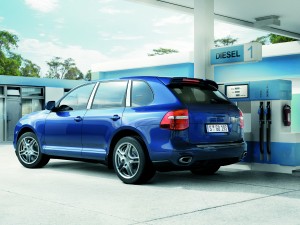Battery technology may be generating the headlines but diesels appear to be grabbing the buyers.
U.S. diesel sales grew by more than 27% last year and could post another big jump in 2012, industry officials forecast, with a number of makers adding the high-mileage technology to their line-ups. Among those who are planning to add diesels to their line-up this year are Chrysler, General Motors and Porsche, while other makers, including Nissan, could follow.
“Without a doubt, 2011 was a key year for the industry’s effort to reestablish clean diesel automobiles in the United States,” said Allen Schaeffer, the Executive Director of the Diesel Technology Forum.
Overall, diesels accounted for more than 3% of the U.S. automotive market last year, with all battery-electric, plug-in and conventional hybrid models combined generating just over 2%.
The diesel market can loosely be divided into two distinct segments: pickup trucks making up the largest, though passenger cars, SUVs and crossovers are rapidly gaining new converts, the data suggest.
Excluding pickups, diesel sales grew 27.4% in 2011, to 101,624, according to tracking firm Baum and Associates. By comparison, hybrid sales slipped 2% for the year, to 268,807, reports HybridCars.com.
Diesel Forum’s Schaeffer says he expects “clean diesel auto sales to increase further as several new diesel cars enter the U.S. market in the next couple of years.”
One of the first to market will be the diesel-powered Jeep Grand Cherokee. General Motors, meanwhile, has confirmed plans for a diesel version of the compact Cruze that should push highway mileage into the 50 mpg range. Porsche has also announced plans to bring its first diesel to the U.S. market, with the Cayenne diesel expected to reach market sometime later this year.
Mazda is also expected to enter the segment with the diesel version of its new SkyActiv technology. It has not yet confirmed which product will come first, nor specified timing.
Other makers considering diesel options include Honda and Nissan. The latter maker had been reluctant to add the technology, Rich Miller, the senior manager of truck planning, suggesting that trying to interest U.S. buyers in diesel was selling diesels in the U.S. was “like pushing water uphill.”
But Miller noted German makers have been gaining traction – diesels accounting for as much as a third of the U.S. demand for models like the Mercedes-Benz M Class and Volkswagen Jetta. And with Detroit makers set to follow, Nissan is now revisiting the subject and could add diesels of its own in the next couple years – most likely for models like the big Titan pick-up and the all-new Pathfinder. A newly-redesigned version of that crossover, which will go up against the Grand Cherokee, is making its debut at this month’s Detroit Auto Show.
The challenge for diesel manufacturers is primarily cost – though availability is a problem in some parts of the country — with diesel options running several thousand dollars above gasoline technology. That’s a key reason, Chrysler CEO Sergio Marchionne said last week he does not expect to see the maker offer diesels in some of its own small vehicles.
But diesel technology is particular well-suited, many analysts believe, to midsize and larger products, as they will be challenged to deliver the sort of mileage improvements needed for the 34.5 mpg government standards set to take effect in 2016. And hearings will be underway in Washington, D.C., this week, on a further increase to a proposed 54.5 mpg by 2025.
What’s uncertain is whether the growth in diesel demand will continue to outpace that of hybrids in 2012. In fact, last year’s gas-electric numbers were likely distorted by the impact of the March earthquake and tsunami in Japan, which led to months of severe shortages of all Japanese vehicles.
Analysts expect hybrid sales to again go into positive territory for 2012, though without a sharp run-up in fuel prices they may continue to lag behind the overall market’s growth.

